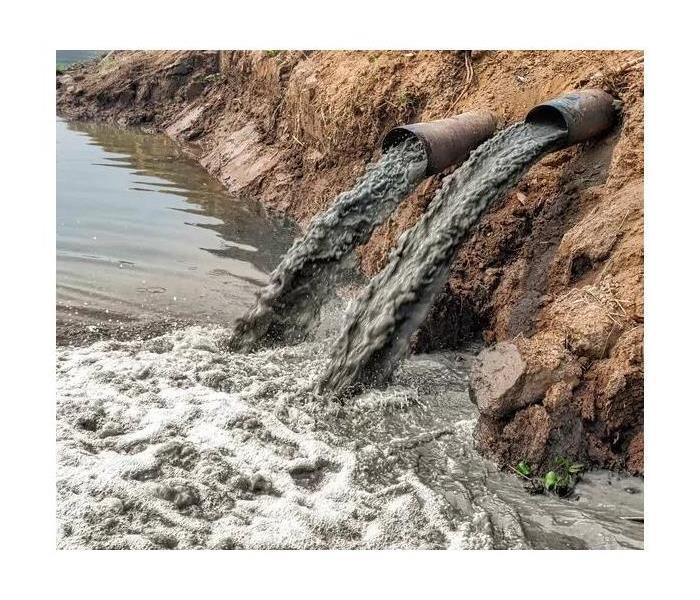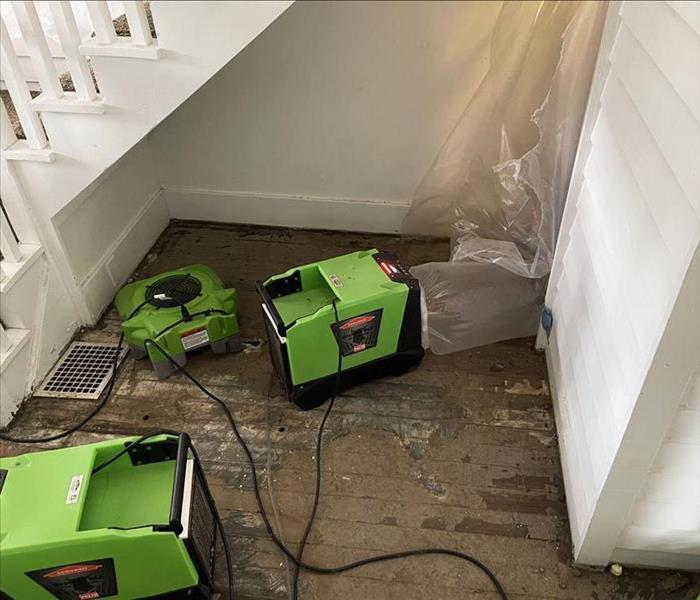Recent Posts
April Showers Bring May Water Damage
4/16/2024 (Permalink)
As the saying goes, "April showers bring May flowers," but they also bring potential water damage challenges for homeowners. Springtime rains can be relentless, posing risks to properties and creating a need for vigilant maintenance. In this blog post, SERVPRO of Jackson/Crockett County provides essential tips to help you safeguard your home from the perils of spring water damage and navigate the restoration process effectively.
Inspect and Clean Gutters: Gutters play a crucial role in directing rainwater away from your home's foundation. Over time, leaves, debris, and winter buildup can clog gutters, causing water to overflow and potentially infiltrate your home. Regularly inspect and clean gutters to ensure proper drainage.
Evaluate Your Roof: Your roof is your first line of defense against spring showers. Inspect it for loose or damaged shingles, as well as any signs of wear and tear. Addressing roof issues promptly can prevent leaks and water damage to your home's interior.
Seal Windows and Doors: Ensure that windows and doors are properly sealed to prevent water infiltration. Check for gaps, cracks, or damaged weatherstripping, and replace or repair as needed. Proper sealing not only protects against water but also improves energy efficiency.
Check for Foundation Cracks: The foundation is a vulnerable point for water intrusion. Inspect your home's foundation for cracks or gaps and seal them promptly. This helps prevent water from seeping into basements or crawl spaces, reducing the risk of flooding and mold growth.
Install Sump Pump and Battery Backup: If your home is prone to basement flooding, consider installing a sump pump. This device helps prevent water buildup in low-lying areas. Additionally, having a battery backup ensures continued operation during power outages, providing extra protection during heavy rainfall.
Landscaping Considerations: Proper landscaping can help divert water away from your home. Ensure that the ground slopes away from the foundation, preventing water from pooling around the base of your home. Use mulch to help absorb and manage water runoff.
Monitor Indoor Humidity: Spring showers can contribute to increased humidity levels indoors. Use dehumidifiers in areas prone to dampness, such as basements, to maintain optimal humidity levels and prevent mold growth.
Act Swiftly in Case of Water Damage: Despite preventive measures, water damage can still occur. If you notice signs of water intrusion, such as water stains, dampness, or a musty odor, act swiftly. Contact SERVPRO of Jackson/Crockett County for professional water damage restoration services. Our experts are equipped to assess, mitigate, and restore your property to its pre-damage condition.
Document and Communicate: In the unfortunate event of water damage, document the affected areas and contact your insurance provider promptly. Communication is key in expediting the claims process and ensuring that necessary restoration steps are taken promptly.
Mold Prevention and Awareness
3/4/2024 (Permalink)
Mold is a persistent intruder that can silently invade our homes, posing risks to both property and health. As your trusted SERVPRO®, we understand the importance of mold prevention and awareness to safeguard your home. In this blog post, we'll explore key strategies to keep mold at bay and raise awareness about the signs and risks associated with mold growth.
Understanding Mold:
Mold is a type of fungus that thrives in damp and humid environments. It reproduces through tiny spores that are invisible to the naked eye, making it easy for mold to go undetected until it becomes a significant problem. Common household molds include Aspergillus, Cladosporium, and Stachybotrys chartarum (black mold).
Mold Prevention Strategies:
Control Moisture: The most effective way to prevent mold growth is to control moisture levels in your home. Regularly inspect and fix any leaks in the roof, plumbing, or walls. Use dehumidifiers in damp areas like basements to maintain optimal humidity levels (ideally between 30-50%).
Proper Ventilation: Ensure proper ventilation in bathrooms, kitchens, and other areas prone to high humidity. Use exhaust fans and open windows to improve air circulation, reducing the likelihood of mold formation.
Regular Cleaning: Keep your home clean and dry. Regularly clean and dust surfaces to eliminate the food source that mold needs to thrive. Pay special attention to areas prone to moisture, such as bathrooms, kitchens, and basements.
Use Mold-Resistant Products: When renovating or building, consider using mold-resistant materials. Mold-resistant drywall and paint can provide an extra layer of protection against mold growth.
Monitor Indoor Humidity: Invest in a hygrometer to monitor indoor humidity levels. This simple device can help you identify potential issues and take preventive measures before mold has a chance to develop.
Mold Awareness:
Recognizing Signs: Familiarize yourself with the common signs of mold growth. These include a musty odor, visible mold patches, and the presence of water stains on walls or ceilings. Early detection is crucial to preventing extensive damage.
Professional Inspection: If you suspect mold or notice signs of its presence, seek professional inspection and remediation services. SERVPRO Team Caldwell is equipped with the expertise and tools to assess and address mold-related issues effectively.
Navigating Winter Woes
2/13/2024 (Permalink)
As winter tightens its grip, SERVPRO Team Caldwell is here with essential tips to help you navigate the challenges that the season brings. February is the perfect time to address winter-related issues and ensure your home remains a warm and safe haven. Join us as we share insights into winter home maintenance to keep your property in top shape.
Protecting Pipes from Freezing: With plummeting temperatures, frozen pipes become a concern. Insulate exposed pipes, especially in unheated areas like basements and attics. Dripping faucets can also prevent freezing. If you're planning to be away, consider shutting off the water supply and draining the pipes.
Gutter Maintenance: Clogged gutters can lead to ice dams, causing water to seep into your home. Regularly clean gutters and remove debris to ensure proper drainage. Installing gutter guards can also be a valuable investment in preventing clogs.
Checking for Roof Leaks: Heavy snow and ice accumulation can lead to roof leaks. Inspect your roof for any signs of damage, missing shingles, or leaks. Addressing these issues promptly can prevent water damage to your home's interior.
Winterizing Outdoor Faucets: To prevent frozen pipes and potential water damage, disconnect garden hoses and use insulated faucet covers on outdoor spigots. Consider shutting off outdoor water supplies if not in use during the winter months.
Heating System Maintenance: Ensure your heating system is in top condition by scheduling a professional inspection. Replace filters regularly, and consider upgrading to a programmable thermostat to optimize energy efficiency.
Sealing Drafts and Insulation: Keep the warmth inside by sealing drafts around windows and doors. Check for gaps or cracks and use weatherstripping or caulk to seal them. Adequate insulation in attics and walls can also significantly reduce heating costs.
Snow and Ice Removal: Regularly remove snow and ice from walkways, driveways, and the roof. Use a snow blower or shovel to prevent slips and falls. Clearing snow from your roof can prevent ice dams and the associated water damage.
Emergency Preparedness: Equip your home with essential emergency supplies, including flashlights, batteries, and an emergency kit. Be prepared for power outages by having alternative heating sources and a plan in place.
The Dangers of Extreme Heat
6/30/2023 (Permalink)
Extreme heat can be dangerous to both people and property. Heat-related illnesses, such as heat exhaustion and heat stroke, can be life-threatening. In addition, extreme heat can cause damage to personal property, such as warping and cracking of wood, melting of plastics, and damage to electronics.
Tips for Staying Safe During Extreme Heat Warnings
Drink plenty of water and avoid alcohol and caffeine, which can dehydrate you.
Tip #2: Stay Cool
Limit outdoor activities during the hottest parts of the day, typically between 10 a.m. and 4 p.m. If you must be outside, wear a hat and sunscreen and take frequent breaks in the shade or in air-conditioned buildings.
Tip #4: Protect Your Property
Check on elderly neighbors, friends, and family members who may be more susceptible to heat-related illnesses.
Extreme heat warnings can be dangerous to both people and property, but by taking precautions and staying informed, you can stay safe during the summer months. Remember to stay hydrated, stay cool, limit outdoor activities, protect your property, and check on others. Stay safe and enjoy the summer!
Water Contamination Categories
3/29/2023 (Permalink)
Flooding can have a devastating impact on your commercial or residential property
It can be difficult to predict the full extent of water and storm-related damages. Extracting the water is just the first step that our professionals take to thoroughly dry and restore water and storm-damaged areas inside and outside of your property. Floodwater is dangerous, and it is advised to contact a reliable property damage restoration company such as SERVPRO Team Caldwell which specializes in natural disaster and flood cleanup and remediation. It can be difficult for the average property owner or management team to determine if the contaminated areas and contents of your property have been properly remediated, to avoid continued damage from mold growth. Our restoration technicians are IICRC trained and certified with countless hours of experience responding to local property damage cleanups and repairs. While assessing your property damage, SERVPRO Team Caldwell will help determine what parts of your loss our team can clean, sanitize and restore. Our restoration teams work closely with our construction crews and management to provide a seamless transition from destruction to reconstruction. That's why it's best to call a local property disaster restoration company like SERVPRO Team Caldwell to fill in the blanks. Our Professional staff will come and inspect your damage and customize a removal, cleanup, and restoration solution to get your property damage reversed as quickly and effectively as possible.
Different Types of Contaminated Water Categories
- Category 1: Clean water originates from a sanitary source such as a broken pipe, or another water source; rainwater is also considered clean and poses no substantial risk from dermal, ingestion, or inhalation exposure. However, it may not always remain clean after it meets other surfaces or materials.
- Category 2: Gray water is used to classify slightly contaminated water and has the potential to cause discomfort or sickness if contacted or consumed by humans. It may contain potentially unsafe levels of microorganisms or nutrients for microorganisms, as well as other organic or inorganic matter (chemical or biological).
- Category 3: Black water is highly contaminated and filled with pathogenic, toxigenic, or other harmful agents. Such water sources may carry silt, organic matter, pesticides, heavy metals, regulated materials, or toxic organic substances. Black water is typically caused by sewage damage, flooding or any type of natural disaster; black water should always be handled by trained professionals. Different types of contaminated water pose different risks, but the longer the water stays in a home, the more severe the property damage it will cause and the greater the threat to your health. Also called black water, Category 3 water is water from sewage backups and overflowing rivers that contains various hazardous contaminants, sewage, and/or toxic debris. According to the Institute of Inspection Cleaning and Restoration Certification (IIRC) and the Environmental Protection Agency (EPA), all water originating from seawater, ground or surface water, rising rivers and streams, and wind-driven rain from hurricanes and tropical storms is considered Category 3.
Residential Storm Damage Tips
2/21/2023 (Permalink)
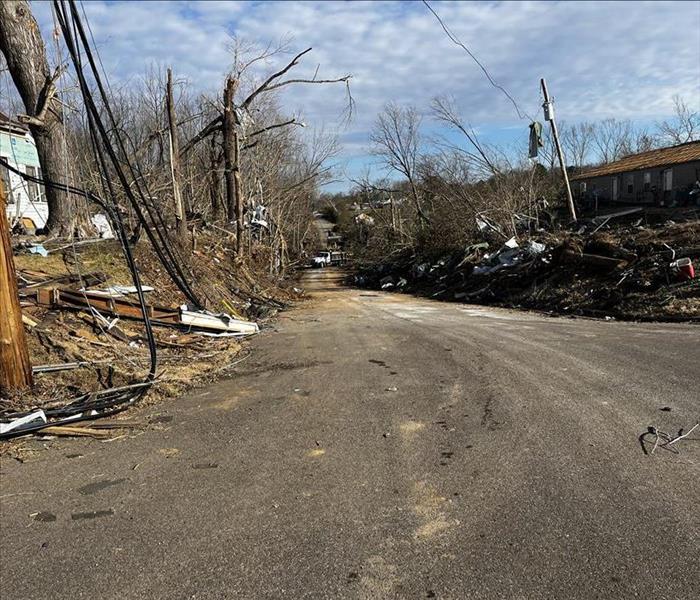 Storm Damage from December 2021 Tornado in Dresden, TN
Storm Damage from December 2021 Tornado in Dresden, TN
Severe weather conditions can wreak havoc on your residential property, causing extensive damage and disruption to your daily life. As a homeowner, it's essential to take proactive measures to reduce the risk of residential storm damage and prepare for the worst. Here are some residential storm damage tips, how to reduce the risk of residential storm damage, and what to do to make the residential storm restoration process quicker.
Reduce the Risk of Residential Storm Damage
- Keep your gutters clean: Gutters that are clogged with leaves, debris, or dirt can cause water damage to your residential property during a storm. Regular cleaning of your gutters can help prevent such damage.
- Trim trees: Large trees or branches close to your residential property can pose a threat during a storm, as they can easily fall and cause extensive damage. Trimming trees around your home can significantly reduce the risk of residential storm damage.
- Secure loose items: Outdoor furniture, gardening tools, and other loose items around your residential property can become dangerous projectiles during a storm. Secure these items or store them indoors to prevent damage.
- Invest in storm-resistant features: Consider investing in storm-resistant features like impact-resistant windows, reinforced doors, and storm shutters. These features can significantly reduce the risk of damage during a storm.
What to Do During and After a Storm
- Stay informed: Stay updated on weather forecasts and heed any warnings or alerts from the National Weather Service or local authorities. This information can help you make timely decisions about whether to evacuate or take other safety measures.
- Stay indoors: During a storm, stay indoors and away from windows and doors. If necessary, take shelter in an interior room or basement.
- Document the damage: Take pictures and videos of any storm damage to your residential property. This documentation can help speed up the insurance claims process and the residential storm restoration process.
- Contact a professional storm restoration company: If your residential property has suffered storm damage, contact a professional storm restoration company like SERVPRO Team Caldwell immediately. They have the expertise, tools, and equipment to handle any residential storm damage and get your property back to its pre-storm condition as quickly as possible.
How to Make the Residential Storm Restoration Process Quicker
- Contact your insurance company: Notify your insurance company of the storm damage as soon as possible. Provide them with all the necessary information, including photos and videos of the damage.
- Call a professional storm restoration company: Contact a professional storm restoration company like SERVPRO Team Caldwell to assess the damage and begin the restoration process. They will work with you and your insurance company to ensure that the restoration process is quick and efficient.
- Follow the restoration company's recommendations: The restoration company will provide recommendations on what needs to be done to restore your residential property. Follow these recommendations promptly to ensure that the restoration process is as quick as possible.
- Stay in communication: Stay in communication with the restoration company and your insurance company throughout the restoration process. This can help you stay informed about the progress and any delays in the restoration process.
Reducing the risk of residential storm damage and preparing for the worst is critical for homeowners. By following these residential storm damage tips and contacting a professional storm restoration company like SERVPRO Team Caldwell, you can quickly restore your residential property to its pre-storm condition and minimize the impact of a storm on your daily life.
Necessity of Odor Removal
2/14/2023 (Permalink)
 Pets are not the only cause of odors in a residential property
Pets are not the only cause of odors in a residential property
Unpleasant odors can make any space feel unwelcoming and even pose health risks. Whether you have a persistent musty smell in your home, a foul odor in your commercial property, or an unexpected source of stench after a fire, flood, or mold infestation, you need a reliable and effective odor removal service that can restore your indoor air quality and peace of mind. That's where SERVPRO Team Caldwell comes in. As the #1 choice in restoration and cleaning services, we understand the importance of addressing odor issues promptly and thoroughly. Odor removal is not just about masking unpleasant smells. It involves identifying and eliminating the source of the odor. With state-of-the-art equipment, advanced techniques, and EPA-approved products, our odor removal professionals can tackle a wide range of odors and underlying causes, such as:
- Smoke and soot from fires
- Water damage and mold
- Pet urine and feces
- Chemical spills and biohazards
Why is odor removal necessary?
Health concerns
Unpleasant odors can be an indication of mold, bacteria, or other harmful substances that can cause health problems. These contaminants can cause allergies, asthma, or other respiratory issues.
Property damage
Unpleasant odors can also be a sign of property damage. For example, if you smell a musty odor, it could be an indication of water damage or mold growth. If left unattended, this can cause significant damage to your property.
Eliminate embarrassment
Unpleasant odors can be embarrassing, especially if you have guests or customers visiting your property. It can leave a bad impression and cause people to avoid visiting your property in the future.
How SERVPRO Team Caldwell can help
At SERVPRO Team Caldwell, we understand the importance of odor removal, and we have the necessary skills and equipment to eliminate any unwanted smells. Our team will conduct a thorough inspection of your property to locate the source of the odor. Once we have identified the source, we will use our specialized equipment and cleaning products to remove the odor completely.
Odor Removal Process
Our odor removal services are available for residential and commercial properties. We offer a fast, reliable, and effective solution to any unpleasant odors in your property by using a multi-step process for odor removal that is customized to the specific needs of each customer. Here's what you can expect when you work with us:
- Inspection and Assessment: Our team will inspect the affected area and assess the severity of the odor. This allows us to determine the best course of action for odor removal.
- Containment: In some cases, we may need to contain the affected area to prevent the odor from spreading.
- Odor Removal: We use a variety of techniques to remove the odor, including air scrubbers, thermal fogging, and ozone generators.
- Cleaning: We'll clean and sanitize the affected area to remove any remaining odor-causing particles.
- Restoration: Finally, we'll restore your home or business to its preloss condition, making any necessary repairs or replacements.
When you choose SERVPRO Team Caldwell for your odor removal needs, you can expect:
- 24/7 emergency response: We understand that odor issues can arise at any time, and we're ready to help you whenever you need us. Our team is available 24 hours a day, 7 days a week, to respond to your call, assess the situation, and start the odor removal process.
- Certified and trained technicians: Our technicians are certified by the Institute of Inspection, Cleaning and Restoration Certification (IICRC) and undergo ongoing training and education to stay up-to-date with the latest odor removal techniques and best practices.
- Comprehensive services: We don't just cover up odors with fragrances or masking agents. We take a holistic approach to odor removal, addressing both the odor source and the affected materials and spaces. We can also provide content cleaning, air duct cleaning, and other related services to restore your property to its preloss condition.
- Satisfaction guarantee: We stand behind our work and want you to feel confident and satisfied with the results. That's why we offer a guarantee on all our services and strive to exceed your expectations with our professionalism, communication, and quality of work.
Odor removal is an essential service that every property owner should consider. It is crucial to address the problem promptly to avoid any health concerns, property damage, or embarrassment. If you're struggling with an odor issue, don't wait to contact SERVPRO Team Caldwell. We're here to help you breathe easier and enjoy a fresh, clean, and healthy indoor environment. Call us today to schedule an inspection or request a free estimate.
Central U.S. Earthquake Awareness Month: Understanding the Importance of Preparedness
2/3/2023 (Permalink)
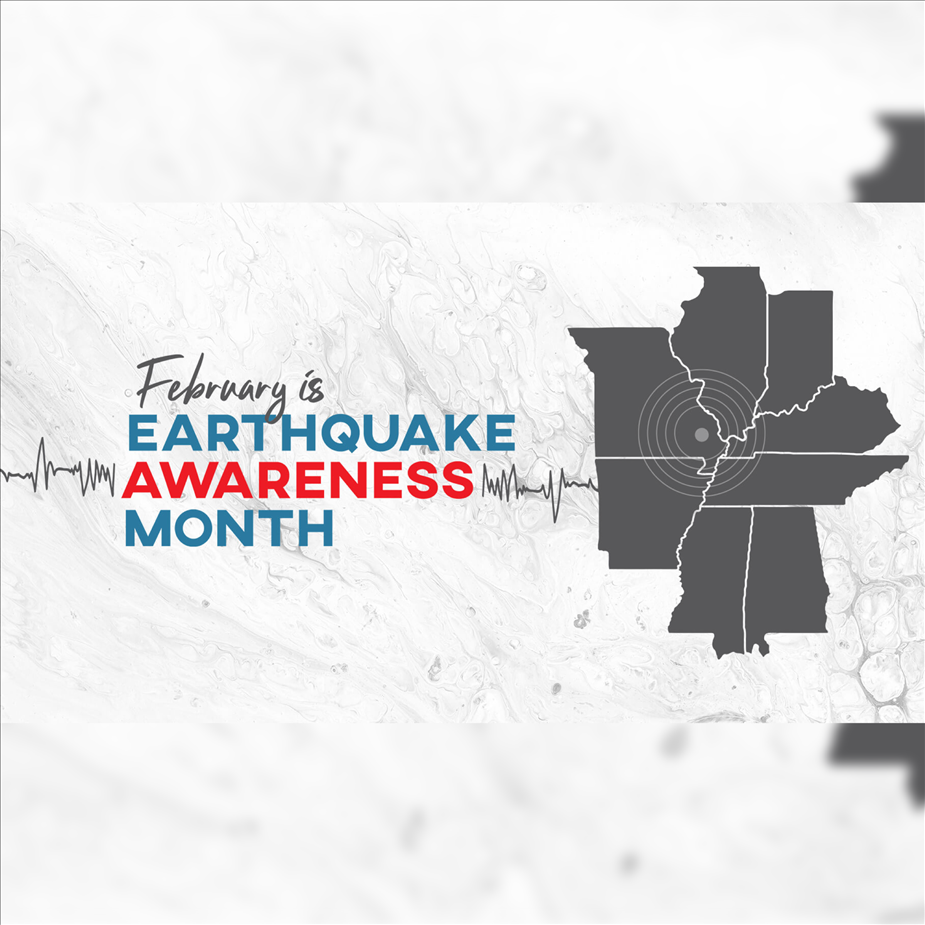 February is Central U.S. Earthquake Awareness Month - CUSEC
February is Central U.S. Earthquake Awareness Month - CUSEC
Unlike weather events, earthquakes strike without warning, sometimes leaving devastation and anguish behind. In the U.S., earthquakes typically occur along the West Coast. However, there is potential for earthquakes in all states, with the Central U.S. having the greatest risk. To raise awareness about the importance of preparedness for earthquakes, and remind citizens and communities of their risk, the Central United States Consortium (CUSEC) has designated the month of February as Central U.S. Earthquake Awareness Month. February is also the anniversary of the last of the earthquakes that struck the central U.S. in the winter of 1811 - 1812, which caused the Mississippi River to flow backwards and created Reelfoot Lake State Park.
The CUSEC is a partnership of state and federal agencies, universities, and other organizations working together to reduce the impact of earthquakes in the central United States. Through this partnership, CUSEC provides resources and information to help communities prepare for and respond to earthquakes.
Earthquakes frequently occur here in Tennessee because the Volunteer State lies two seismic zones, or areas prone to earthquakes - the New Madrid Seismic Zone (NMSZ), in the western part of the state, and the East Tennessee Seismic Zone. About 2,000 earthquakes occur in the central U.S. every year, many of which go unnoticed. "Many Tennesseans are surprised to know that earthquakes are a hazard in Tennessee," stated Patrick Sheehan, the director of the Tennessee Emergency Management Agency (TEMA). "Earthquake awareness month is an opportunity for individuals, businesses, and organizations to plan for the unexpected. We don't know when the next earthquakes will happen, but we can prepare and learn how to protect yourself, your family, your business, and your community before the ground starts shaking. I urge all Tennesseans to take meaningful action and prioritize earthquake preparedness."
Earthquakes can cause widespread damage, power outages, and road closures, making it difficult to access essential services such as food, water, and medical care. In the event of a large earthquake, response and recovery efforts can take days, weeks, or even months. There are steps you can take to protect yourself and your family, and by acting today, you can reduce your vulnerability to earthquakes that may happen in the future.
Precautionary measures to take before an earthquake strikes.
Following earthquake safety precautions could mean the difference between your physical safety and injury, and between property damage and devastating financial loss. With a safety plan in place, proper supplies, and securing your home against hazards, you can increase your chances of riding through a major earthquake safely.
Prepare for an Earthquake:
The steps you take before an earthquake may have the biggest impact on your safety and the protection of your personal property. Top earthquake safety precautions include:
- Secure items that could topple or fall over during an earthquake, such as water heaters, televisions, book shelves, breakable objects on shelves, and pictures and mirrors on walls.
- Create an emergency kit for you, your family, and pets with enough supplies to last everyone at least 3 days.
- Have an out-of-state contact in your emergency plan, and plan where to meet if your family is separated.
- Consider an earthquake insurance policy since standard homeowners insurance does not cover earthquake damage.
- Consider retro-fitting your home, building, or other structure to make it less vulnerable to collapse during an earthquake.
- Download the ReadyTN app to receive important emergency and weather alerts.
During an Earthquake:
You may only have seconds to protect yourself in an earthquake before strong shaking knocks you down or drops something on you. During the next big earthquake, and immediately after, is when your level of preparedness will make a difference in how you and others survive and can respond to emergencies. Practicing helps you be ready to respond.
- Drop, Cover, and Hold On to protect yourself during an earthquake. Drop to your hands and knees. Cover your head and neck with your arms. Hold on to any sturdy furniture until the shaking stops.
- If in bed, stay there and cover your head and neck with a pillow.
- If inside, stay there until the shaking stops. DO NOT run outside.
- If in a vehicle, stop in a clear area that is away from buildings, trees, overpasses, underpasses, or utility wires.
- If you are in a high-rise, expect fire alarms and sprinklers to go off. Do no use elevators.
- If near slopes, cliffs, or mountains, be alert for falling rocks and landslides.
After and Earthquake:
After the immediate threat of the earthquake has passed, your level of preparedness will determine your quality of life in the weeks and months that follow. Remember many injuries occur after an earthquake. Aftershocks—following large quakes—can cause damage in their own right.
- Expect aftershocks to follow the largest shock of the earthquake.
- Check yourself for injuries and provide assistance others if you have training.
- If in a damaged building, go outside and quickly move away from it.
- Do not enter damaged buildings.
- If you are trapped, cover your mouth. Send a text, bang on a pipe or wall, or use a whistle instead of shouting so that rescuers can locate you.
- Save phone calls for emergencies.
- Use extreme caution during post-disaster clean-up of buildings and around debris.
- Do not remove heavy debris by yourself. Call SERVPRO to start the cleanup of damage done to your home or business
While earthquakes are not a common occurrence in Tennessee, it is important to be prepared and stay safe in the event of an earthquake. Central U.S. Earthquake Awareness Month is an important opportunity to educate ourselves about the potential dangers of earthquakes and how to prepare and stay safe during an earthquake. By following these tips, you can help protect yourself and your loved ones during an earthquake. Remember, it is always better to be prepared and stay safe than to be caught off guard in an emergency situation.
The Water Restoration Process
3/30/2022 (Permalink)
When experiencing the first few moments of a water disaster, you are typically flooded with emotions while also trying to quickly figure out what to do next. Knowing what to do in the event of a water disaster will allow for a faster restoration process, and will save you time and money.
If water damage is left unaddressed for a while, secondary damage can occur. SERVPRO of Jackson/Crockett County is your 24-hour emergency water and fire restoration company. We are “Faster to any size disaster” with our six-step water damage restoration plan.
6 Steps Water Damage Restoration Plan
- Initial Emergency Contact
Water disasters are typically unexpected and hardly ever occur at an ideal time for home or business owners. This is why SERVPRO is available and prepared 24/7 to help you when disaster strikes. Once you have made the initial phone call, a SERVPRO professional will ask you important questions regarding the situation. Our goal is to gather as much information about the disaster and draft a response plan specific to your situation. This response plan gives us an idea of how many technicians and equipment are needed to start the restoration process at your home or business.
- Inspection & Damage Assessment
Once SERVPRO technicians are on-site, we will immediately verify that the property is safe and take the necessary measures to prevent any further damage to the affected area if it is within our capabilities. Once your property is safe and secure, we will then conduct a thorough inspection of the affected areas to determine the next best course of action. We will then report our findings to the home or business owner.
- Moisture Extraction
To prevent the development of mold or other secondary damage, SERVPRO technicians begin to quickly extract standing water that can seep into belongings surrounding it. Our high-performance grade vacuums and water pumps accomplish this task rapidly and can remove hundreds of gallons at a time.
- Dehumidifying & Drying
After all of the standing water has been extracted, the moisture removal process can begin. SERVPRO dehumidifiers and high-grade dryers are used to pull moisture out of the air and out of porous surfaces in your home or business such as wood or fabrics. This process is what deters mold from growing and can help prevent further damage.
- Cleaning Belongings
All items that have come into contact with the water are prone to becoming a contamination hazard. The water may have come from a clean source, but the water passes through other unknown materials. This is why we take the sanitization process so seriously. To prevent hazards, SERVPRO of Jackson/Crockett County will thoroughly remove unwanted microbes from your belongings. SERVPRO also provides a deodorization service that removes musty, water-damage smells.
- Restoration & Repair
Once on the scene, SERVPRO will see your home or business restoration through to the end. You can count on us to never leave you with a partially completed job. SERVPRO not only handles the cosmetic aspects of the restoration process, but we tackle the construction details too. SERVPRO of Jackson/Crockett County can repair structural damage, apply paint and complete the finishing touches on your home or business “Like it never even happened.”
Faced With Sewage Damage To Your Business?
3/28/2022 (Permalink)
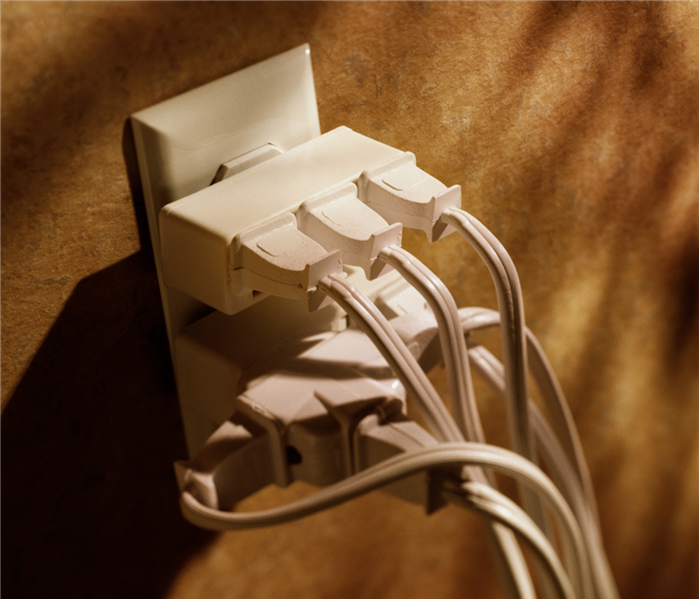 Be sure to unplug all electronic devices after a sewage disaster.
Be sure to unplug all electronic devices after a sewage disaster.
Coming into work Monday morning to find sewage damage in your business or commercial property can be frightening and disgusting. You may be tempted to throw in the towel, but you'll need to be alert throughout the entire sewer cleanup process! Specific steps need to be followed if your sewage disaster is more than a simple floor leak. While SERVPRO of Jackson/Crockett County professionals can do the cleaning for you, there are three procedures you execute if you encounter sewage damage in your business.
- Address The Electronics
The first step you should take is eliminating any safety hazards near the sewer backup, specifically electronic devices. Without coming in contact with the sewage, all items or devices that run on electricity need to be turned off or unplugged as soon as possible! Surrounding areas could become hazardous if the water touches one of these items. Below is a brief list of devices to be mindful of in a business or commercial property setting:
- Computers/Laptops
- Chargers
- Video Equipment
- Office Printers
- Lobby/Breakroom Televisions
- Create Ventilation: Open Windows
After a sewage disaster, it does not take long before mold begins to grow and is discovered. To avoid additional damage to your business or commercial property, airing out your space is essential! Additionally, the fresh air reduces some of the unruly smell from sewage backflow and moisture in the air.
- Remove Endangered Items
All items that have come into contact with sewage should be left to the professionals to clean and disinfect. For all restorable items, SERVPRO professionals can properly sanitize and return them to your business. If the sewage water is continually leaking, it is wise to remove non-contaminated items from the affected area so no additional property is lost.
The sewer cleanup process at your business or commercial property will go smoother if you remember and execute these three steps! Knowing what you can do to help immediately following a sewage backflow could help save your business money and restoration time. When SERVPRO restoration experts arrive, relay everything you know about the situation. Our goal is to help you get back on your feet as soon as possible! Sewage damage is never pretty, but with SERVPRO of Jackson/Crockett County, it does not have to be debilitating for your business!






 24/7 Emergency Service
24/7 Emergency Service
